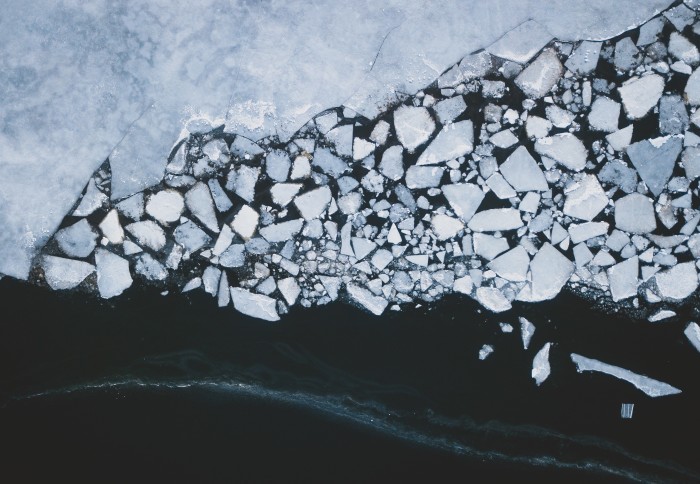Modified sponge could recover oil contaminants from Arctic waters
by Sara West

Researchers have developed a sustainable and economical way to recover oil from ultra-cold industrial wastewater and oil spills.
Scientists from Imperial College London and the University of Toronto have designed a sponge that can remove hard-to-recover oil from Artic waters. Their research builds on previously developed sponge technology to target specific challenges with recovering oil from ultra-cold water.
The findings, published in Science Advances, present an economical and sustainable method of oil recovery which will benefit the environment whilst presenting a cost-effective solution to industry.
Oil contamination in the Arctic
Researchers have developed a special coating for commercially available sponges which can recover oil droplets from water as cold as 5 degrees celsius. Oil is more difficult to remove from ultra-cold water because it becomes viscous at low temperatures, reducing its flow and making it harder to collect.
"We’ve developed an energy efficient way of reclaiming crude oil which has ecological benefits for the environment and is economically beneficial to industry." Dr Pavani Cherukupally Imperial College London
Oil contamination in Arctic waters is a significant issue, with over one trillion litres of oil sands tailings, a waste by-product of oil extraction, marine and Arctic oil spills awaiting clean up.
Traditional technologies used to recover oil from such sites are either energy intensive, costly, or ineffective when faced with micrometre size oil droplets. Some can even risk causing further environmental damage, such as those that reheat the oil before collection, which can cause it to dissolve or evaporate.
The technology designed by Imperial and U of T addresses these challenges by harnessing the properties of cold-temperature oil to create a low-energy and cost-efficient solution. Not only will this benefit the environment and help to protect our natural resources, it offers an economically viable solution for industry which is vital to ensuring widespread uptake.
Mutual attraction
The team at Imperial engineered a special coating for commercially available sponges based on the behaviour of oil droplets in cold water.
When oil is below 38 degree celsius, it begins to crystallise and becomes sticky at the edges. Lead author Dr Pavani Cherukupally used this knowledge to design a paraffin-like sponge coating with the same chemical structure as oil that could create a mutual attraction between the two surfaces.
The sponge can be rinsed with a non-toxic solvent which displaces the sticky oil droplets and allows them to be collected, enabling both the sponge and the oil to be reused. The process is known as wax-wetting, where one fluid is used to displace another. In this case, the solvent, known as heptol, is used to displace the oil droplets.
Once the optimum wax-wetting characteristics had been established, a team of U of T Chemists synthesised the nanocoating which made it functional and ready to use on a larger scale.
Rigorous testing showed that the engineered sponge can adsorb oil droplets from water ranging between 5 and 40 degrees Celsius and remove 90-99% of contaminants within two and a half hours. The recovered oil can be used again by industry, providing an economic benefit to organisations, and the sponge can be reused ten times with consistent results.

Next steps
This method of oil recovery poses significant benefits to both industry and the environment. It has a high success rate for removing oil from ultra-cold water and requires no additional energy input as it uses the material properties of the sponge and oil to generate results.
Lead author Dr Pavani Cherukapally, Imperial College London, explained: “We’ve developed an energy efficient way of reclaiming crude oil which has ecological benefits for the environment and is economically beneficial to industry.
"Our work is significant because it targets a specific issue, oil crystallisation at low temperatures, and addresses it from a materials perspective.”
"As such an important global resource, it is vital that society and industry has access to innovative, low-cost methods for water clean-up like those we report in our study." Professor Daryl Williams Imperial College London
Principle Investigator Professor Daryl Williams added: “If we continue treating the environment as we have been for decades, clean water will become increasingly scarce. As such an important global resource, it is vital that society and industry has access to innovative, low-cost methods for water clean-up like those we report in our study.
“Our technology heralds a new approach for global remediation which we hope will be widely utilised before it is too late.”
Next the team will explore how the sponge can be used to collect and range of oils, which each have a different composition and will behave differently at low temperatures. They are confident that their sponge technology can be adapted to meet these different needs across many different environmental conditions.
-
'Wax-wetting sponges for oil droplets recovery from frigid waters' by Pavani Cherukupally et al is available at Science Advances.
Article text (excluding photos or graphics) © Imperial College London.
Photos and graphics subject to third party copyright used with permission or © Imperial College London.
Reporter
Sara West
Communications Division